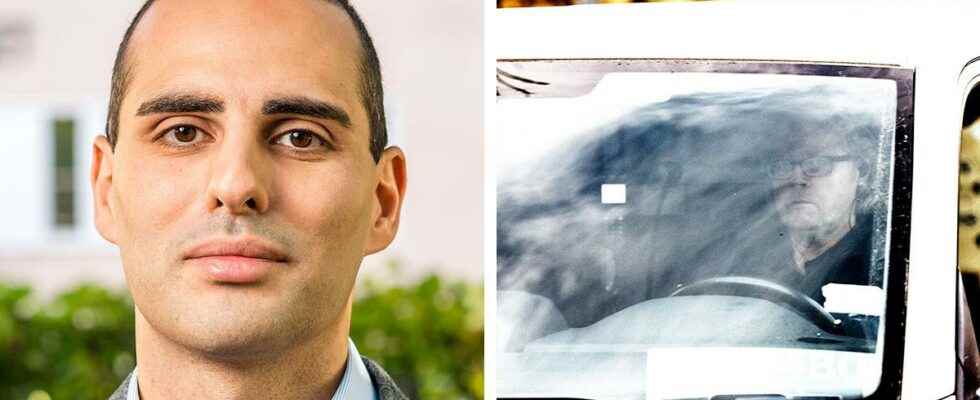Published: Less than 20 min ago
Updated: Just now
“You’re not about to pass out?” asked the interrogator after 146 questions.
The suspected spy Peyman Kia refused to answer and thought the description of the crime was “very imprecise” and “incredibly vague”.
“I have no confidence that this is an investigation that will be conducted with objectivity,” he says.
Peyman Kia, 42, and his younger brother Payam Kia, 35, are suspected of gross espionage on behalf of Russia. They were charged on Friday after being detained since last autumn. Peyman Kia is also charged with gross unauthorized position with secret information.
The suspected crimes must have been committed many years ago. Peyman Kia was arrested in September last year and received information in an initial interrogation that he was suspected of espionage.
He made it clear early on that he would not participate in interrogations, neither answer affirmatively nor negatively. He was skeptical of the description of the crime, the lack of details about what he was actually suspected of and denied any wrongdoing.
– I think it is very imprecise and incredibly vague and therefore have been unable to relate to it. For that reason and other reasons that I must keep to myself for the time being. I have no confidence that this is an investigation that will be conducted with objectivity, he says in questioning.
“You’re not about to pass out?”
The interrogator started asking questions. But Peyman Kia had finished speaking and did not answer at all. He was asked questions about leisure interests, family relationships, assets, social media, finances and his professional roles at the Swedish Food Agency and the Security Police.
After 146 unanswered questions the interrogator says.
– You’re not about to faint? Your eyes seem to be getting smaller and smaller?
Peyman Kia received even more questions, whether he often uses cash and whether it is true that he worked at Säpo on two occasions.
Still no answers.
– Is there any way we can get you to answer questions that you feel you can explain? Can we facilitate you in any way? says the interrogator.
There was silence again and the interrogation ended.
Be skeptical of the investigation
A few days later, Peyman Kia started talking. He had then been notified of an alternative suspicion, gross unauthorized position with secret information in connection with his employment at the Security Police and the Armed Forces, and that he had read several reports.
Peyman Kia then explains that he is skeptical of the investigation and its objectivity and wanted to tell something. Peyman Kia mentioned that the interrogator had sought him out in the cell after he was first served with suspicion of espionage. The interrogator is said to have asked for codes because a search was underway at Kia’s home, which made him feel “a strong uneasiness and concern” that people were in his home. According to Kia, the interrogator said that Kia might have some understanding because he “lived the life he lived”, which made him feel condemned in advance.
– Because it is clear that if you are sitting there as the responsible investigator and have that attitude even before we had an interrogation, then it is crystal clear to me that it also reflects the attitude found in the entire investigation, all other colleagues, investigators, case managers , analyst. So therefore I feel that I have ended up in a situation where it is more or less decided which life I have lived, says Peyman Kia.
The interrogator said that it was “regrettable that it was such a start” and thanked him for his honesty and for telling him about his attitude.
– If it weren’t for the fact that it’s the worst thing I’ve been through in my life, I’d almost laugh instead of crying, says Peyman Kia.
“Vigilant against foreign power”
They then agreed to proceed with the interrogation.
– We drive, says Peyman Kia.
The interrogator asked questions about mobile phones, hard drives and other electronic equipment found.
Peyman Kia says that he has hard drives with family photos and the like and never uses cloud services as he is “a paranoid bastard”. He also does not use social media and the interrogator asks why.
– You work in the same place as I worked before. I am always, ever since I started, vigilant against foreign power. I have assumed that I am mapped and acted accordingly, he says.
Facts
Breach of national security
The crimes of espionage and unauthorized position with a secret mission fall under what is known as a crime against Sweden’s security.
Espionage, according to the law, is the intentional transfer, transmission or disclosure of secrets – such as defense matters – to a foreign power. The information, “the disclosure of which to a foreign power could mean but for Sweden’s security”, does not have to be true.
The penalty for espionage of the normal degree is a maximum of six years in prison, while aggravated espionage carries a prison term of between four and eighteen years or life.
If there is no intention to help a foreign power, the crime is instead an unauthorized position with a secret mission.
The penalty scale for such unauthorized holding of the normal rank ranges from fines to imprisonment for a maximum of two years. For serious crimes, the maximum sentence is four years.
You can also be sentenced for negligence with secret information, if the crime has been committed through gross negligence.
Source: TT, § 5–9, chap. 9 Criminal Code, Swedish Constitution
Read more
